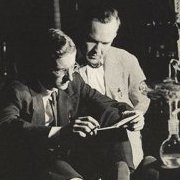-
Posts
4586 -
Joined
-
Last visited
-
Days Won
12
Content Type
Profiles
Forums
Events
Everything posted by hypervalent_iodine
-

Chemistry calculation on Methyl Ethanoate
hypervalent_iodine replied to Copyright's topic in Organic Chemistry
OK. The aim of the task that the question is asking you is to make up a certain volume of a 50 mM solution of some compound. So, if you wanted to make 1L of that solution, you would need 50 mmol or 0.05 moles of whatever that compound is in 1L of solvent. Let's say we don't need 1L. Let's say that we only need 0.5 L, or 500 mL. To do that, we only need 0.5 x 0.05 moles, or 0.025 moles of your compound made up to 0.5 L with your solvent. Similarly, if you wanted 2L, you would use 2 x 0.05 moles, or 0.1 moles of your compound. In your question, you only need 25 mL of solution, or 0.025 L. So how many moles of your compound do you need to make up that much solution? -

Chemistry calculation on Methyl Ethanoate
hypervalent_iodine replied to Copyright's topic in Organic Chemistry
No. Sorry, I take that back. You correctly converted mM to M. Your working out is right with everything else, but you're not answering the question it's asking you, so all your numbers and steps are wrong. I'll post a more detailed explaination if I have time later. For now, think about this. Why would you assume that the question is telling you that you have 25 mL of methyl acetate when it's asking you what volume of methyl acetate you need? -

Chemistry calculation on Methyl Ethanoate
hypervalent_iodine replied to Copyright's topic in Organic Chemistry
The question isn't asking you to make a 50 mM solution from 25 mL of your ester, it's asking you to make 25 mL of a 50 mM solution of your ester; in other words, the 25 mL should be 50 mM. You need to work out how many moles of methyl acetate would be in 25 mL of that solution and go from there. -

Is this considered IUPAC naming?
hypervalent_iodine replied to Bastardane's topic in Organic Chemistry
Without seeing the structures, I can only tell you if you've used proper IUPAC syntax. The first one is fine. An isopropoxy group is just -OiPr The second one is okay, except you're missing an a in hexadecamine. You could, and normlly would, also replace 1-methylethyl with isopropyl and the 2-methylpropyl with isobutyl (yes, these are common names). The third one I think you should have diene instead of just ene, as you've put 2 numbers before it, which indicates two double bonds. Fourth one is also fine. -
The oxo prefix simply refers to =O. Oxomethyl means you have a =O attached to a methyl group, giving you the -CHO group. Having 3-(oxomethyl) means that the -CHO is attached to the 3 position, as in your compound.
-
Sorry, I had meant to say 3-formylpentanoic acid / 3-(oxomethyl)-pentanoic acid.
-
That's just the way they're defined. If you were to only invert some but not all of the stereocentres, you'd end up with a different sugar. An anomer is a specific kind of epimer that refers to the two diastereomers that arise when considering the stereoconfiguration of the C-1 position of cyclic sugars. Note that this carbon is not stereogenic in the linear form of the sugar. I'm not really sure what you mean here, but I'll have a go at elaborating on what I said before. The definition of whether a particular sugar is D (or L) configuration has to do with the configuration of the stereocentre that is the furtherest from the most oxidised end of the straight chain molecule. The L (or D) version of that same sugar has all of the stereocentres inverted by definition. As I said before, if it were just one or two, etc., then it would be a diastereomer and it would not be the same sugar. For example: Idose is a diastereomer of glucose as it differs in the configuration around three of the four stereocentres. If we look at the D sugars, you'll see that in both cases, the stereocentres furtherest away from the aldehyde group (in blue) are in the (R) position, whereas in the L sugars that same carbon is in the (S) configuration. If we were to change the configuration of only that carbon in say, D-glucose, what we end up with is not L-glucose, but in fact L-idose. Similarly, if we changed the configuration of that carbon in D-idose, we'd end up with L-glucose rather than L-idose. Hope that clarifies things for you a little bit.
-
Well, oxo really applies to any group with a =O in it, so were it another type of aldehyde attached to that structure, you would use oxo. For instance, if we had something like this: The carboxylic acid is still the parent functional group, which means it still ends in -oic acid. The aldehyde is at the 6 position and the ethyl group is at position 4, making the full name of the compound, 4-ethyl-6-oxohexanoic acid. Edit: I agree with John that 2-formylpentanoic acid would be the name you would use for your compound, although I also think that 2-(oxomethyl)-pentanoic acid would be correct.
-
The cleverly named Son_of_Hal has been banned as a sock puppet of Hal and ACUV.
-
STeve555 has been banned for once again losing his mind and making a series of foul threads and posts.
-
! Moderator Note Please keep this on topic and PainwithoutLove, please do not hijack other threads with your own speculations.
-
! Moderator Note It was recently brought up in a staff conversation that we possibly spend too much time waiting for crack pots to get to the point and present their evidence, when we should really be enforcing the 'must provide evidence' clause from the get go. PainwithoutLove, you were given your chance(s), you ignored them and now this thread is closed. You are not permitted to reintroduce the topic.
-

New Research States Brain Is An Interface
hypervalent_iodine replied to dt1's topic in Anatomy, Physiology and Neuroscience
! Moderator Note Then discuss them. We usually only allow links in threads if they are there to support the content of the post of provide supplementary information. This means you first have to make a substantial post. -
Ewmona has moved this to a new topic, http://www.scienceforums.net/topic/72628-the-source-of-morality-for-theists-and-atheists/ , if you'd like to add your discussion there.
-
Probably not anymore.
-

hey guys i was wondering about this question
hypervalent_iodine replied to maskman`'s topic in Inorganic Chemistry
! Moderator Note jamesnichols, Please stop hijacking threads with your pet theory. You have your thread, so please keep the discussion there. -

The source of morality for theists and atheists
hypervalent_iodine replied to ewmon's topic in General Philosophy
This works too, I guess. I'll just copy my comment from the other thread here. -
There were a few comments made by ewmon in another thread that I wanted to address here as the setting is more appropriate. The argument made by him and many others is that morality is impossible without religion. I disagree with this for a number of reasons, the predominent one being that I do not believe the evidence is in support of moral instincts evolving from religion, but rather developing much earlier than and independant of religion. The claim that athiests do not ascribe to moral codes and do 'whatever feels good' is as false as it is offensive. We owe a great deal of our success as a species to our ability to cooperate with other members of the same group to achieve greater goals; this cooperation is dependant on prosocial mechanisms, which in turn give rise to standards in our instinctive moral judgement. Since this level of interaction has been present in societies predating religious factions and is present across all societies irrespective of the predominant religious belief (or lack thereof, as the case may be), it's hard to argue that its origins may be found in any religion, let alone one in particular. More prudently, studies (http://www.sciencedirect.com/science/article/pii/S1364661309002897 has a good overview of these) have shown that inituitive moral judgement is not only the same between people of different religions, but also between religious and non-religious people. And of course, regardless of all that, the Bible is full of atrocities that no sane person would call good moral behavior. How can the Bible be the source of ethical code when, for instance, it codones acts such as slavery?
-

Are all religious people hypocrites?
hypervalent_iodine replied to Mr Rayon's topic in General Philosophy
! Moderator Note Please try and keep the specific conversation about whether morality is exclusively a religious / Christian invention, etc., to other threads. Incidentally, ewmon, I am planning on responding to some of your comments here.

